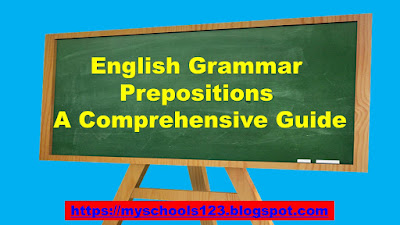Prepositions Explanation
Definition:
- The Preposition is a word
which is placed a noun or a pronoun
and it shows relation to some other
words in a sentence.

English Grammar Prepositions A Comprehensive Guide
Eg:- I am
interested in painting
She
is fond of music
He
is applied for a Job
Raju
is good at English
Kinds of Prepositions: -
There
are mainly three kinds of preposition
They are:-
1.
Simple prepositions
2.
Compound prepositions
3.
phrase prepositions
1. Simple
Preposition: - In, at, on, by, for, from, of, off, up,
with, to
2. Compound
prepositions: - Before,
between, among, behind, beside.
3. Phrase
prepositions:- In spite of, owing to, in front of, instead
of because of, on account of, In case of, etc.
Also Check
15 + Yes / No Type Questions List
Keywords For English Grammar Tenses
Active And Passive Voice Rules
USES OF
SIMPLE PREPOSITIONS
1. Use of ON:-
1. ‘on’ is
used with the names of weekdays and dates.
Eg: - My friend will come on Tuesday
My birthday is on 15th
August
2. ‘On’ is used to show the
position of something above something with connecting in resting position.
Eg:-
1.The book is on the table
2.
She sat on the chair
3.
The cat is on the wall
౩.‘ On’ is used to show the direction of something.
Eg:- 1.
a man sat on the left of
2. Latha
who sat on your right is beautiful.
2. Use of
‘IN’:-
1. ‘IN’ is used before the names of
months and years.
Eg:-
1.We got freedom in 1947.
2. Examination
will be conducted in May.
3. Mangoes are available during in summer season.
2. ‘In’ is used before the name of
countries, big cities, and towns.
Eg:- 1.They are lived in
2. My friend lives in Hyderabad.
3. They have been living in
Hyderabad since 2000.
4. I have been working here in Vijayawada
for 17 years.
3. ‘In’ is
used before the times of the day.
Eg:- 1.He came here in the morning.
2. She saw me in the evening.
3. Use of
“At”:-
1. At is used before small towns and Villages, streets.
Eg:- 1.Sita is living at
Pamarru.
2. My parents work at Gudivada.
2. At is used to express the exact time.
Eg:- 1.The teachers comes to college at 9o clock every day.
2.The train arrives at the station at 8. p.m.4. Use of
with:-
1. ‘With’ is used with things
(instruments)
Eg:- 1.Raja killed his
wife with a knife.
2. The thief broke
the door with a hammer’
3. Rani cut the
vegetables with a knife.
4.
He killed the snake with a
stick.
5. Use of “By”:-
1. “By” is used in the passive voice.
Eg: Pandavas were helped by Krishna.
2. “By” is used to
show the mode of travel.
Eg:- by bus,
by
car,
by
train,
by Jeep
3. ‘By’ is used to refer to future time.
Eg:- 1.We can get the certificate by next July.
2.
I will go to the market by next
Wednesday.
3. The Principal comes to College by bike.
6. Use of
‘For’:-
1. ‘For’ is used to indicate a period of time and
purpose.
Eg:- 1.
Mohan has been waiting here for
2 hours.
2.
My uncle has been living in Hyderabad for
10 years.
3.
We applied for Job.
7. Use of ‘since’:-
1. “Since” indicates the point of time used in the present
perfect and present perfect continuous tense.
Eg:- 1. I have
been working as a teacher of English Since 2004.
2.
It has been raining Since morning.
8. Use of
‘Between’:-
1. ‘Between’ is used to indicate two persons or things
and places.
Eg:- 1.Surya
Sat between Uma
and Suma.
2.
He works between
10 am and 5 pm.
3.There is no comprehension between
Raju and Lavanya.
9. Use of among:-
1. ‘Among’ is used when there are more than two persons or
things.
Eg:- 1.The principal
sat among her
students
2.
The Principal distributed the Prizes among the students.
3.The six brothers shared the property among themselves.
10. Use of Beside:-
1. Beside
is used by the side of.
Eg:- 1.My
house is beside the
hospital.
2.I
stood beside my
wife in the photograph.
11. Use of Besides:-
1. Besides is used in the meaning of “in addition to”.
Eg:-1.I prepare Chapathi Besides
Puri.
2. I know Telugu besides English.
3. I take Coffee besides milk
4. She plays chess besides caroms.
12. Use of upon:-
1. ‘Upon’ is used to indicate movement of item.
Eg:- 1. The tiger is jumped
upon the deer.
13. Use of To:-
1. ‘To’ is used to indicate
place, direction, and after (before) the following (words) adjectives junior, senior, superior,
inferior, prefer.
Eg:-
1.They walked to
the west
2. Raju is Junior to
Rani
3. I prefer Coffee to tea
4. I go to college daily.
14. Use of Into:-
1. ‘Into’ is used to show the movement of something from one medium to
another.
Eg:- 1. She jumped into the well.
2. They went deep into the forest.Also Check
Adjectives A Comprehensive Guide












0 Comments:
Post a Comment